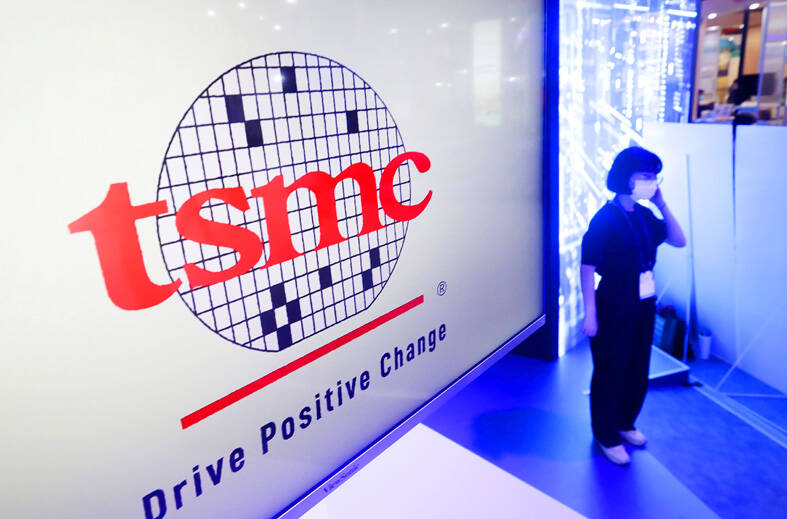Taiwan Semiconductor Manufacturing Co (TSMC, 台積電), the world’s biggest contract chipmaker, is reportedly to halt supply of artificial intelligence (AI) chips and graphics processing units (GPUs) made on 7-nanometer or more advanced process technologies from next week in order to comply with US Department of Commerce rules.
TSMC has sent e-mails to its Chinese AI customers, informing them about the suspension starting on Monday, Chinese online news outlet Ijiwei.com (愛集微) reported yesterday.
The US Department of Commerce has not formally unveiled further semiconductor measures against China yet.

Photo: Chiang Ying-ying, AP
“TSMC does not comment on market rumors. TSMC is a law-abiding company and we are committed to complying with all applicable rules and regulations, including applicable export controls,” TSMC said in an e-mail yesterday.
The chipmaker’s move came as it faces mounting pressure from the US department to comply with its semiconductor restrictions, underscoring the escalation in the China-US technology war, the report said.
Last week, TSMC stopped 7-nanometer chip shipments to China-based chip designer Sophgo Technologies Ltd (算能科技) after a chip it made was found on a Huawei Technologies Co (華為) AI chip.
The suspension of TSMC chips would deal a heavy blow to China’s AI and GPU designers and undermine their chip performance and competitive edge, the report said.
TSMC might gain greater business opportunities from the US by following the commerce department’s rules, it added.
Taiwan’s chip companies are warned to brace for stricter regulations after US president-elect Donald Trump won the election.
Trump last month accused Taiwan of “stealing” the US chip industry and threatened to levy tariffs on chips from Taiwan.
As TSMC is a major supplier of advanced chips to Nvidia Corp, Advanced Micro Devices Inc and Intel Corp, any tariff hikes could inflate electronics prices and increase US inflation, it remains to be seen whether Trump would impose sweeping or selective tariffs, Macronix International Co (旺宏) chairman Miin Wu (吳敏求) said on Thursday.
Macronix is the world’s biggest supplier of NOR flash memory chips.
To safeguard US advancements in AI technology, there is a likelihood that the US might request TSMC to produce all cutting-edge chips in the US, including the most advanced chips, given rising tension between Taiwan and China, Wu said.
Without adequate bargaining power, TSMC and the government might find it difficult to turn down the request, Wu added.
TSMC is to ramp up production of 4-nanometer chips at its first US fab in Arizona next month. The chipmaker plans to build two more advanced fabs in Arizona for the production of 2-nanometer and more advanced chips in the US.

RUN IT BACK: A succesful first project working with hyperscalers to design chips encouraged MediaTek to start a second project, aiming to hit stride in 2028 MediaTek Inc (聯發科), the world’s biggest smartphone chip supplier, yesterday said it is engaging a second hyperscaler to help design artificial intelligence (AI) accelerators used in data centers following a similar project expected to generate revenue streams soon. The first AI accelerator project is to bring in US$1 billion revenue next year and several billion US dollars more in 2027, MediaTek chief executive officer Rick Tsai (蔡力行) told a virtual investor conference yesterday. The second AI accelerator project is expected to contribute to revenue beginning in 2028, Tsai said. MediaTek yesterday raised its revenue forecast for the global AI accelerator used

TEMPORARY TRUCE: China has made concessions to ease rare earth trade controls, among others, while Washington holds fire on a 100% tariff on all Chinese goods China is effectively suspending implementation of additional export controls on rare earth metals and terminating investigations targeting US companies in the semiconductor supply chain, the White House announced. The White House on Saturday issued a fact sheet outlining some details of the trade pact agreed to earlier in the week by US President Donald Trump and Chinese President Xi Jinping (習近平) that aimed to ease tensions between the world’s two largest economies. Under the deal, China is to issue general licenses valid for exports of rare earths, gallium, germanium, antimony and graphite “for the benefit of US end users and their suppliers

Dutch chipmaker Nexperia BV’s China unit yesterday said that it had established sufficient inventories of finished goods and works-in-progress, and that its supply chain remained secure and stable after its parent halted wafer supplies. The Dutch company suspended supplies of wafers to its Chinese assembly plant a week ago, calling it “a direct consequence of the local management’s recent failure to comply with the agreed contractual payment terms,” Reuters reported on Friday last week. Its China unit called Nexperia’s suspension “unilateral” and “extremely irresponsible,” adding that the Dutch parent’s claim about contractual payment was “misleading and highly deceptive,” according to a statement

Artificial intelligence (AI) giant Nvidia Corp’s most advanced chips would be reserved for US companies and kept out of China and other countries, US President Donald Trump said. During an interview that aired on Sunday on CBS’ 60 Minutes program and in comments to reporters aboard Air Force One, Trump said only US customers should have access to the top-end Blackwell chips offered by Nvidia, the world’s most valuable company by market capitalization. “The most advanced, we will not let anybody have them other than the United States,” he told CBS, echoing remarks made earlier to reporters as he returned to Washington